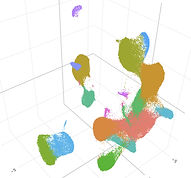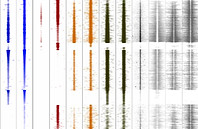Decoding transcriptional programs to rewire immune responses in health and disease
Our immune system is constantly shaped by infectious, environmental, genetic, and epigenetic influences. When these responses fail to be properly regulated, they can result in uncontrolled inflammation or an inability to clear pathogens, driving acute and chronic diseases. Beyond genetic variability between individuals, epigenetic regulation of gene expression by transcription factors (TFs) plays a pivotal role in determining whether immune responses are protective or pathological.
At the Inflammation Genomics Laboratory, we aim to uncover how transcriptional networks control immune function in health and disease. By combining state-of-the-art molecular biology, single-cell and multi-omics technologies, and functional genomics, we seek to decode how immune cells are programmed—and how they can be reprogrammed for therapeutic benefit.
Our basic-to-clinic research spans four interconnected axes:
Genetic Variants & Immune Dysregulation
Defining how genetic variation shapes immune responses in infections and chronic inflammatory diseases, with a focus on hypothyroidism, rheumatic diseases, and interstitial lung diseases.
Transcriptional & Epigenetic Reprogramming
Discovering and characterizing TFs that govern immune cell development, function, and plasticity under stress and disease conditions.
Vector-Borne Infections & Host–Pathogen Interactions
Investigating immune responses and pathogen strategies in Borrelia, Leishmania, and Plasmodium, alongside the genomics of antimicrobial resistance.
Towards New Therapies
Leveraging mechanistic insights to develop innovative antimicrobial and anti-inflammatory strategies for immune-mediated diseases.






























